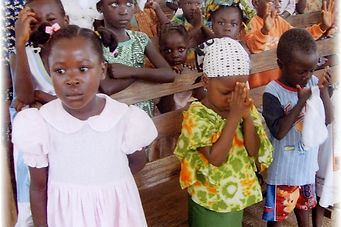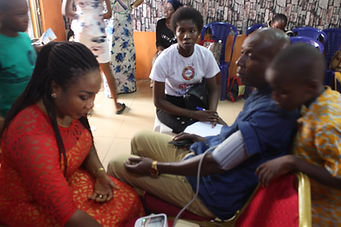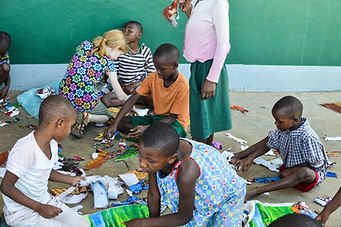
Oasis of Love International Center for Women and Children (OLIC)
07054653179

Strength is service to humanity





Mental health issues have become very big challenges in Nigeria today. There are many unreported cases of mental disorders which have rendered many people incapacitated. Our communities, orphanages and prisons are filled with people who exhibit a different kind of psychopathology. There is a lack of awareness of mental illness, stigma, and limited facilities to meet mental health needs. OLIC understand that the prisoners, orphans, poor people are the undeserved group in our society and they suffer more of mental illness than other groups.
Orphanage Children
Orphans are the special group of children who are generally deprived and prone to developing mental health disorders even those that are raised in orphanage homes. These children and adolescents living as an orphan or in a stigmatized environment such as orphanage home in Nigeria are vulnerable because of the loss of parent figures. Researchers have found that orphanage children are more likely to suffer from internalizing problems such as depression and anxiety. Orphans are more depressed, more anxious about the future, less optimistic about the future and more likely to express anger feeling and have more disruptive behaviour about the future. Orphans are more vulnerable to psychological disorders such as depression, anxiety, PTSD, and low self-esteem. Therefore orphanage children and teenagers are highly in need of effective counselling to cope with their problem.
Children who grow up in orphanage usually have no social connection and these children are at disadvantage for completing high school, going to school or getting job opportunities, all of these factors may be contributing factors in predisposing a child to psychopathology.
Research indicated that orphan who got counselling services when they need it has a lower probability of being depressed. It is against this research and information that OLIC provides a psychological outreach program for the orphanage children. This program aims at providing psychological assessments (Depression, anxiety, stress and trauma screening) psychotherapy, psych education, and counseling services to the orphanage children in order to prevent incidence of psychological disorder and to treat those who already display symptoms of depression, anxiety, PTSD, stress, or low self-esteem and disruptive behaviors.
PRISONERS
There are more than 10 million individuals in prison at any given time with more than 30 million circulating through each year. Research has consistently shown that prisoners have high rates of psychiatric disorders, and in some countries, there are more people with severe mental illness in prisons than psychiatric hospitals. Despite the high level of need, these disorders are frequently under diagnosed and poorly treated. Imprisonment harms mental health. Overcrowding, various forms of violence, enforced solitude, lack of privacy, lack of meaningful activity, isolation from social networks, insecurity about future prospects (work, relationships, etc.), and inadequate health services, especially mental health services, harm mental health.
The prevalence of poor mental health among prisoners is considerably higher than in the community, and studies worldwide have shown that suicide rates in prisons are up to 10 times higher than those in the general population. Nevertheless, prisoners are also less likely to have their mental health needs recognized and to receive psychiatric help or treatment. They are most susceptible during the remand period.
Despite the size of the problem, prison services have had little guidance on mental health, including health promotion and the reduction of the harm that may arise from imprisonment. In addition, prison staff dealing with disturbed or otherwise difficult prisoners may experience workplace-induced stress, with implications for their mental and physical well-being and the good management of prisons
COMMUNITIES
Mental health disorders are not uncommon, and the global burden of mental health disorders is projected to reach 15% by the year 2020. By this time, it is estimated that common mental disorders such as depression, anxiety, and substance abuse-related disorders, will disable more people than complications arising from AIDS, heart disease, accidents, and wars combined
In Nigeria, an estimated 20%–30% of our population is believed to suffer from mental disorders.[2] This is a very significant number considering Nigeria has an estimated population of over 200 million. Unfortunately, the attention given to mental health disorders in Nigeria is at best, fleeting; the level of awareness of the Nigerian public on mental health issues is also understandably poor, and the misconceptions regarding mental health have continued to flourish.
The 2006 WHO-AIMS report on the mental health system in Nigeria made some telling revelations. It reports that “there is considerable neglect of mental health issues in the country. The existing Mental Health Policy document in Nigeria was formulated in 1991. Since its formulation, no revision has taken place and no formal assessment of how much it has been implemented has been conducted. No desk exists in the ministries at any level for mental health issues and only four per cent of government expenditures on health is earmarked for mental health
Mental illness is not uncommon in Nigeria. The World Health Organization (WHO) estimates that four per cent of Nigerians suffers from depression. Yet there is still considerable neglect of mental health in Nigeria, and those who visibly suffer from mental illness are largely stigmatized. For example, individuals who show symptoms of psychosis (hearing voices or seeing things that are not there) are often labelled as “crazy”, publicly beaten and deprived of rights essential to dignified living. Individuals suffering from mental illness are generally seen as dangerous, regardless of their type or diagnosis of mental illness
Oasis of Love International Center (OLIC) introduced medical and psychological outreach to provide health services to this vulnerable and underserved group of people. Poverty, ignorance, stigma and lack of awareness prevent these people from seeking medical and mental health help. Many have become handicapped as a result of mental illness. Medically, Nigerians do not seek medical treatment unless they are being struck with a deadly sickness such as stroke, diabetes, heart attack, cancer or other serious ailments. We do not take into account the preventive measures to address the issues before it becomes serious.
Our outreach programs will provide Free
-
Depression, anxiety, trauma and stress screening
-
Mental health counselling
-
Mental health awareness
-
Physical health assessment
-
Blood pressure check
-
Blood sugar check
-
Malarial and typhoid test
-
Distribution of medicine
-
Spiritual counselling
-
Mentor-ship and life coaching
OLIC will continually provide free psychological service to the orphanage children to ensure they grow healthy psychological, emotionally and spiritually.
We will need your support financially to reach many communities, orphanages, prisons, and churches
Contact us on 08147551641 or info@oasislovecenter.org





olic medical and psychological outreach
